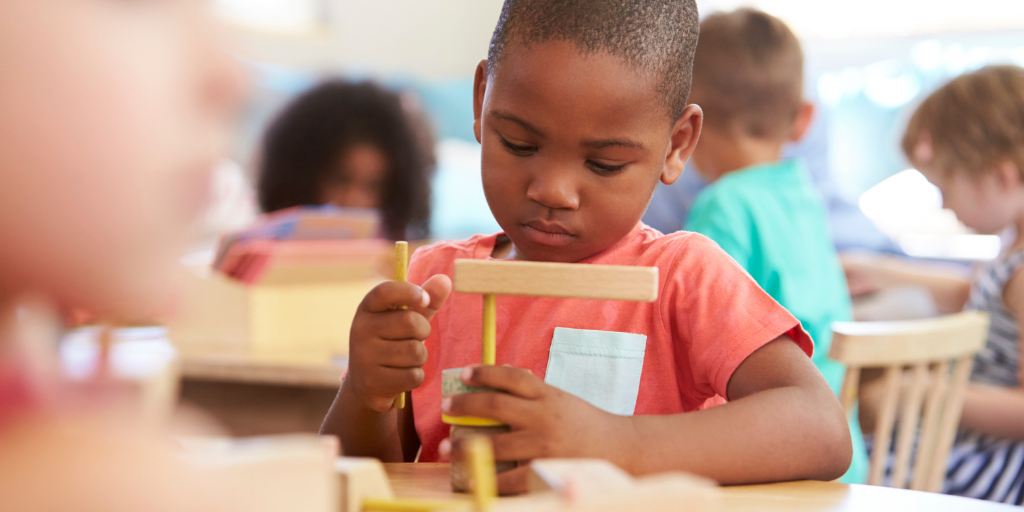Pedagogy is a big word – and maybe justifiably so. What we do as EYFS educators is highly skilled and complex and we know that what we do as adults has a huge impact on the children that we work with.
If we think of the curriculum as the ‘what’ children learn, the progression of knowledge, skills, behaviours and competencies that they need to be successful -then pedagogy is the ‘how’ that makes this happen.
The distinction is an important one. Although we have a clear idea of the curriculum – what we want children to know and understand – pedagogy, the ‘how’ is, and can be, very different depending on what is being taught and learned and the child that we are working with.
For example, we know that children need to develop their social skills; this is a Prime Area of Learning and Development in the EYFS. We know that we want them to co-operate with other children, take turns, share resources and materials, have conversations and build up relationships. This is the Curriculum. In order to do this, we deliberately and consciously do things to support this. We talk to children about the importance of being friends and what this means, we model how to share and collaborate, we read stories about people working together, we intervene in children’s activity to support them to resolve conflicts, celebrate acts of thoughtfulness and kindness and so on. This is pedagogy, the things we do to make the curriculum happen.
Our skill as educators is to know what to do when, and to who in order to support and extend their learning, development and progress. Part of that skill is knowing which part of the curriculum the child need at that point and part of that skill is knowing how best to make that happen.
Each day, research tells us, we have about 1000 interactions with children. Each of those moments is a mixture of that skill and it is vital that we develop what is called a ‘pedagogical repertoire’ that is knowing how to respond and support children to do this. Over time, and with experience and building up knowledge of children, this starts to become ‘intuitive’, and we realise that we are making decisions almost subconsciously and is both ‘in the moment’ and planned. So, part of understanding our own pedagogy is trusting our professional judgment, based on experience and informed by reflection and CPD. We know that individual children and groups of children, need different things and different times and how we respond to them is guided by their needs and what we know about them. So, some children need us to talk to them as they are doing something because we need to model the language that they need to acquire. Other children need time and space to work things out for themselves, and while we might observe, we would not interact (or interfere!) with what they are doing until or unless we think it is needed. Each of these micro decisions that we take constantly every day is the basis of our pedagogical repertoire and it is vital that we develop the confidence to trust this as a professional.

Part of this is also the importance of being aware of the different ways in which effective teaching and learning take place. As experienced and skilled professionals we decide how best and when, to use them but they all have a potential place in our pedagogical repertoire of how best to enable learning, development and progress.
Adult-led whole group sessions provide us with opportunities to ‘deliver’ a concept or idea, to read a story or sing a song or rhyme, to look at an object or celebrate an achievement with every child. Short and focussed they also engender a sense of community and the need to understand what being part of a group involves.
Adult-led small group sessions give us a chance to work with small groups of individuals, fine tuning support to their specific needs and creating a smaller more intimate environment for deeper conversations and social contact.
Child-led independent activity is the time when you decide to stand back and allow a child to explore themselves or with a group of peers. In doing this they demonstrate high levels of motivation, independence, resilience, problem-solving and communication. It Is precisely the absence of the adult that make this possible and is an important part of the child’s experience.
Child-led adult supported activity are those critical moments when, seeing a child follow an interest and undertake their own ‘project’ you decide to intervene, respectfully, skilfully and purposefully to support extend or consolidate their learning.
Pedagogy is the how we do things. It is our professional judgment, knowledge of the child and our aspirations for them that make this possible.

About Jan Dubiel
Jan Dubiel is an Independent Consultant and Adviser and is a nationally and internationally recognised specialist in Early Childhood Education. He was recently identified by the Times Educational Supplement as one of the ten most influential people in British education and served on the Expert group advising the DfE on the recent review of the EYFS. He has previously been Head of National and International development at Early Excellence and the Director of Early Years for AISL Harrow International Schools and Bilingual Kindergartens. He has worked as a YN, YR and Y1 teacher, Senior leader, Consultant and adviser and national lead on the management of the (Early Years) Foundation Stage Profile with QCA. Jan has written widely on different aspects of Early Years policy ,pedagogy and practice. His first book “Effective Assessment in the EYFS” was published by SAGE in 2014.